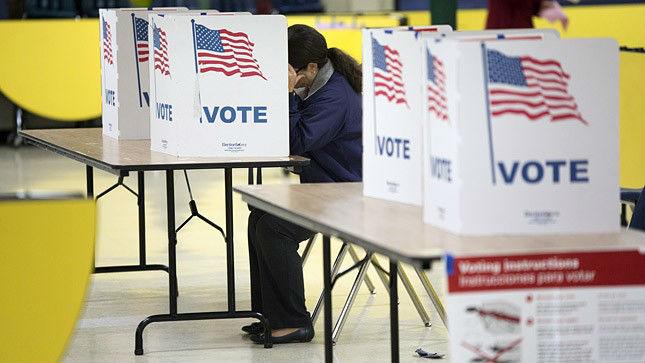Republicans vote to scrap electoral fraud watchdog despite Trump's repeated claim of 'rigged' election
The president has said up to five million votes were cast illegally

Your support helps us to tell the story
From reproductive rights to climate change to Big Tech, The Independent is on the ground when the story is developing. Whether it's investigating the financials of Elon Musk's pro-Trump PAC or producing our latest documentary, 'The A Word', which shines a light on the American women fighting for reproductive rights, we know how important it is to parse out the facts from the messaging.
At such a critical moment in US history, we need reporters on the ground. Your donation allows us to keep sending journalists to speak to both sides of the story.
The Independent is trusted by Americans across the entire political spectrum. And unlike many other quality news outlets, we choose not to lock Americans out of our reporting and analysis with paywalls. We believe quality journalism should be available to everyone, paid for by those who can afford it.
Your support makes all the difference.Republicans in Washington have voted to scrap the commission created to certify and bolster America’s electoral system - despite Donald Trump’s assertion that widespread fraud occurred in the election that brought him to power.
The Election Assistance Commission (EAC) works with state and local officials to “ensure accessible, accurate and secure elections”. The bipartisan, independent organisation, created after the contested 2000 presidential election, is also tasked with certifying and testing voting systems.
But House Administration Committee Chairman Gregg Harper categorised the EAC as “fluff” and a “perfect example of something that can be eliminated”, according to the Associated Press.
The categorisation by Mr Harper, whose committee voted on Tuesday to scrap the EAC, stood in sharp contrast with a letter signed by 38 concerned groups and individuals, which called it “a critical part of the government’s effort to ensure that our elections are fair, efficient, and accessible”.
“Given the crisis of out-of-date machinery in the US and the direct threat that Russian interference played in 2016, we should be taking every step to modernise and strengthen America’s election infrastructure. Instead, they are taking a step backwards, and the people who will suffer are American voters,” Liz Kennedy, director of democracy and government at the Centre for American Progress, one of the organisations that signed onto the letter, told The Independent.
The House Administration Committee also voted to end the public financing system for elections, which is designed to limit the influence of money in politics.
Candidates who choose to receive public funds for their campaigns are prohibited from taking money from powerful donors, an option neither Trump nor Hillary Clinton chose in the 2016 election. The Centre for Responsive Politics estimated that the 2016 election would go down as the most expensive in US history.
The move to eliminate the EAC has drawn criticism from groups on both sides of the debate. Catherine Engelbrecht, founder of True The Vote, an organisation that has supported Trump’s electoral fraud probe, said she was “blindsided” by the announcement.
“It is disappointing because the EAC- particularly in these last few years- has really stepped up efforts to reach out to the states to do more with the posting of information and the facilitation and support of communication between the states. I thought they were a great advocate, and still think they are a great advocate,” she said.
“We need some honest brokers inside of the federal government to stand up for an election process that isn’t nearly what it should be or what Americans deserve,” she added.
The EAC’s chair, Thomas Hicks, reacted to the committee vote in a statement.
“Efforts to dismantle the Election Assistance Commission are seriously out of step with the current US election landscape,” Mr Hicks said.
“Each day, we hear from state and local election officials who need our help to navigate the challenges they face.”
The committee’s decision is also an example of the rift between Mr Trump and congressional Republicans on the issue of voter fraud.
Although the president has repeatedly said there was widespread voter fraud in the 2016 race, House Speaker Paul Ryan has said he has “seen no evidence” that three to five million people voted illegally, as Mr Trump claims.
The EAC also works to ensure ballot box access for non-English speakers and people with disabilities. Advocates worry that dismantling the EAC will disproportionately impact some of America’s most vulnerable voters.
“Developing standards, helping to pass along best practices and creating synergy among election officials and community advocates—these are geared toward helping all voters. But we also know that historically, less-than-ideal voting practices have hit communities of colour harder,” said Terry Ao Minnis, director of census and voting programmes at Asian Americans Advancing Justice, another group that signed onto the letter.
It’s not clear if and when the entire House of Representatives will vote on the measures. But for Ms Ao Minnis and other advocates, it’s about raising awareness about the importance of the EAC.
“We have seen that people want to have fair elections. They want to see access to ballot boxes in a fair, efficient and effective manner. So getting people to understand the value and benefits that the EAC brings to our election system would help show to why there is a continuing need for it,” she said.
For her part, Ms Engelbrecht said her group will continue to support Trump’s probe and push for a “forensic audit” of America’s electoral system.
“This is an issue that should unite us, not divide us. We should look at this as a top priority. Everything we do in government presupposes a free and fair election,” Ms Engelbrecht. “So let's just check the oil.”
Join our commenting forum
Join thought-provoking conversations, follow other Independent readers and see their replies
Comments